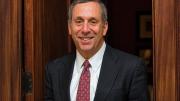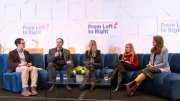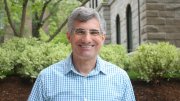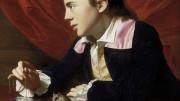President Lawrence S. Bacow, recovered from COVID-19, spoke about his condition, and Harvard’s, during a telephone conversation on Friday, April 3, from his official residence, Elmwood. He has been working there since March 14, according to his announcement March 24 that he been laid low by the coronavirus. “I’m over it,” he said about his experience with the virus. “I’m just reflecting on the state of the world more than anything else.”
The president said that he was safely, medically past the symptomatic stage of the illness, and was “easing back into things” but “not running yet.” The latter is hardly a surprise, but his mention of his regular exercise routine was perhaps the best indicator that he is well along the way to feeling like himself again—even though he is still, by his standards, pursuing a “somewhat reduced schedule” (attending to emails and participating in essential meetings) and putting up with his “staff treating me with kid gloves.”
Obviously, there are plenty of essential issues about which to meet and make decisions, for Harvard’s future.
In Prospect for Harvard: “Hard Choices”
“We face lots and lots of challenges, and lots and lots of uncertainty, and lots and lots of decisions to make going forward,” Bacow said. Reflecting on the hectic past four weeks—from early March, when the coronavirus began infecting an exponentially rising number of Massachusetts residents, prompting the decision to disperse students and faculty and staff members from campus, up to the present—he said the University had made numerous good, early decisions. Not all had been the right decisions, he added, and administrators tried to fix problems and adjust matters accordingly as they proceeded.
Some of the important decisions, Bacow emphasized, had been taken in prior years, as Harvard adapted new policies and procedures in the wake of the financial crisis and ensuing severe recession in 2008-2009. He enumerated decisions to “de-risk” the central bank (the University’s checking-account-like short-term funds, which had been invested along with the endowment during the early 2000s, to achieve higher returns—but at the cost of becoming illiquid), and, more generally, to increase liquid funds on hand. He also noted the accumulation of financial reserves across the institution. He observed that no one could have predicted the current circumstances—a pandemic, prompting burgeoning unemployment and enormous economic losses worldwide—but that he and his team had expected some sort of recession sooner or later. (For more background on those preparations and Harvard leaders’ recent economic outlook, see “The Financial Fallout.”)
Despite being thus prepared (as both an Eagle Scout, and more pertinently, the president who led Tufts University through the Great Recession), Bacow acknowledged, “That doesn’t mean this won’t be painful—it will. It doesn’t mean we won’t have to make hard choices—we will. It doesn’t mean everybody won’t feel it—they will.”
“We’re confronting decisions that none of us ever had to face in the financial crisis.”
Amplifying the situation a bit later, he pointed to known points of vulnerability, comparable to those in 2008-2009, as “The University responds to similar kinds of economic pressures” from an “extreme economic downturn.” He pointed to:
- a decrease in the value of the endowment (to an extent to be determined);
- a likely diminution in philanthropic support (as donors’ resources are reduced, or directed to the current crisis)—and in corporate and foundation support for research;
- a likely increase in the need for financial aid; and
- the uncertain outlook for federal stimulus support for research (a critical feature of the American Recovery and Reinvestment Act of 2009, which supplied significant temporary funding for academic research).
“We’re in much better shape” to address those purely financial challenges than Harvard was a dozen years ago, Bacow emphasized, because of the changes in financial management undertaken since—including the steps taken to reduce the debt the University had to incur during that earlier financial crisis, and lessen the cost of servicing it.
That said, Bacow underlined the crucial difference between then and now that makes it “so much harder” to address this crisis: “It inhibits our ability to deliver on our core mission of teaching and research.” Harvard is a residential institution devoted to educating students and pursuing scholarly discovery—and the pandemic has made it necessary both to disperse the students from campus and to separate professors, at least for now, from essentially everything they need to pursue research: libraries, archives, laboratories, field work, and their graduate students and other members of research teams.
In that sense, “We’re confronting decisions that none of us ever had to face in the financial crisis.” At present, for example, when the U.S. government is not processing visas, foreign students do not even know if they can enter the United States to pursue their studies, at Harvard or elsewhere. That dilemma arises just as students admitted from around the world need to decide whether to come to this country for college or graduate study.
A Constructive Spirit: “People Being Helpful and Kind”
Given those daunting prospects, Bacow repeatedly characterized the community’s response to the new circumstances as productive.
Naturally, some of the most difficult decisions (like the March 10 announcement that students would be asked to leave campus by March 15 and not return from spring recess, ending instruction in residence) encountered initial skepticism that the institution was “acting prematurely,” he said, but “that died down quickly.” He saw “people being helpful and kind to others”—for example, as some 200 faculty members pitched in to help students move out of their dorms. (Bacow and his wife, Adele Fleet Bacow, tried to assist, too, he said, but his staff persuaded him to desist—fortunately, given his subsequent coronavirus diagnosis.)
The decisions were “absolutely” informed by the University’s scholarly expertise, he said. In early January, he set up a group to monitor the situation as news came out of Wuhan: there are Harvard students from that region, and faculty members who conduct research there. That group drew upon University specialists in infectious diseases, epidemiology, virology, and public health, giving Harvard leaders early insight into the developing pandemic. And among the leaders who could put what they learned into perspective, he continued, are the provost, Alan Garber, a physician who has studied and written about epidemics; and the executive vice president, Katie Lapp, who has had management experience in New York City in the wake of 9/11 and in the issues involved in public transportation and public safety. So, there was a lot of “subject-matter expertise on staff.”
As the storm gathered, Bacow continued, “The big thing for me was the cost of being wrong was asymmetrical”—the terrible price of inaction if predictions of a pandemic were validated, versus the costs of erring on the side of caution. His decisions were driven, further, by the emerging data from Massachusetts, an early hot spot, where reported cases of coronavirus infections proliferated, from a low base, at an exponential rate. That local trend, seen in the context of the experiences in China, Italy, and Spain—and on the cruise ships that had multiple passenger infections—all set the context for prompt, sweeping action.
“I have a whole campus full of cruise ships,” Bacow said. “They’re called dormitories.” As spring recess approached, the prospect that students would disperse to locations worldwide, potentially becoming exposed to the virus, and then come back together to their close campus living quarters, forced the issue: “We had to act before spring break. The decision to do it wasn’t very hard.” Moreover, he noted, “By acting quickly, we could make it easier for other institutions to make hard decisions” of their own.
The preparation for the March 10 announcement was undertaken during the preceding week and a half, he indicated. Before pivoting to remote teaching and learning, the University had to know whether it was possible. Bacow pointed to “a lot of expertise we could lean on” from the investment in online learning via edX and HarvardX—now under the auspices of the vice provost for advances in learning, Bharat Anand (who also had hands-on experience creating Harvard Business School’s online platform and courses). “Another real hero in this is Anne Margulies” (vice president and chief information officer), whose information-technology staff, Bacow said, made certain that Harvard had sufficient Zoom capacity, infrastructure, and faculty and staff training in place before March 10, so remote learning could begin March 23, at the end of spring recess.
With reasonable assurance that the transition, in the interest of community safety, could be effected, Bacow said he briefed the Corporation on the plans during a March 9 meeting. With the governing board’s blessing, the University put them into action the following day. In retrospect, the process seems an encouraging stress test of the institution.
The Way Forward: “We’re Very Much Focused on the Fall”
In the meantime, Harvard scientists are collaborating with peers worldwide to address the coronavirus. From the establishment of a partnership with the Guangzhou Institute of Respiratory Health early this year, Bacow said, the University has been the epicenter of such research in the United States, coordinated by Medical School dean George Daley, but involving faculty members from across Harvard and at MIT, Boston University (which has a high-level, biosecure research laboratory), the Broad Institute, the Ragon Institute, all the affiliated teaching hospitals, and the Boston-area biotechnology community. “Some remarkable work has been done in a very short period of time,” Bacow said, ranging from testing for the virus to the earliest human trial of a potential vaccine. That work is, obviously, at the core of Harvard’s mission.
Not every aspect of the mission can be pursued so straightforwardly. The School of Engineering and Applied Sciences, scheduled to move into the Allston science and engineering complex during the summer, now finds its plans in limbo, as construction work has been halted. “We were so close,” Bacow said, “we were doing the finish work, we were going to move people in right after Commencement.” (This complex, redesigned, is of course the huge science facility on which construction had to be halted a decade ago in the wake of Harvard’s financial constraints during the Great Recession.) Now, he said, those plans are among the many “nested decisions under enormous uncertainty” that Harvard must confront.
No decision looms larger, nor consumes more waking hours, than what to anticipate for academic operations next August.
Similarly, a working group is determining how to proceed with a virtual conferring of degrees, in place of Commencement, which has had to be postponed. From the trials of 2008, Bacow said, he had learned “how to get out of the way of the people who need to do the real work,” identifying constraints and possible solutions. From that process, the means of awarding degrees in late May will emerge.
No decision looms larger, nor consumes more waking hours, than what to anticipate for academic operations next August. “Obviously, we’re very much focused on the fall,” Bacow said. Working groups in every school are identifying the dates by which time they need to decide how and whether to proceed (on enrollment, on how teaching will be conducted, and so on). And then, on those dates, the course of the pandemic and public measures to control it will have to be assessed. The planning, still early, involves different scenarios for each school and each possible set of external circumstances. “My fear,” he continued, “is that at the point at which we have to make the choice, there will still be a tremendous amount of uncertainty” abroad in the world.
Despite all that, Bacow said he could already discern useful lessons from the University’s recent experiences. Researchers are learning that they don’t always have to get on an airplane to advance their work, and are “much more flexible about how they accommodate work outside the office”—suggesting a future in which places like Harvard might be able to rethink offices and the heavy investment they entail. Of necessity, faculty members are adopting new ways of teaching—in ways that might have taken decades in the ordinary course of events. And on a larger scale, Harvard is “finding ways to collaborate with different parts of society and different institutions,” pointing to more such desirable ventures in the future.
In Personal Perspective
During a conversation last summer, after his first year leading Harvard, President Bacow said that he always counseled new presidents to expect the unexpected. At Tufts, he said then, “every year was unto itself, often shaped by circumstances that could not be foreseen at the start of the year”—beginning, for him, at the outset of his presidency, with the tragedy of 9/11, and followed later in the decade by the Great Recession. A leader can plan, he said, but not predict.
No one predicted the coronavirus cutting its way around the world, sending students home for their own safety, shuttering libraries and laboratories, or confining the president and his wife to isolation at home once they were diagnosed with COVID-19.
At the conclusion of this most recent conversation, Bacow said, he had been consulting with his predecessors and peers for perspective and as a check on his thinking. When Drew Gilpin Faust was appointed president in 2007, he sent her a note to the effect that the second year in office was always the hardest. During the depths of the financial crisis in 2008, she recalled that note and wrote back that “You never said it would be this hard.” During his latest conversation with Faust, he said, she returned the favor, reminding him of their exchange
On a personal level, Bacow can now report his recovery from a fortunately mild, if unpleasant, encounter with the coronavirus. One may hope for something similar for Harvard, as it finds its way toward reconfiguring its academic mission, pursuing urgently important research and education to help grievously wounded people—newly ill, newly threatened by economic adversity, in the United States and around the world—find their own new footing.
Separately, the Gazette published an interview with President this morning, available here.









